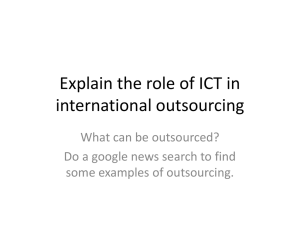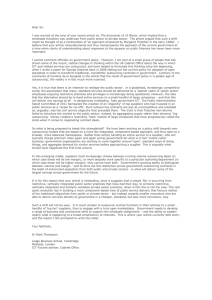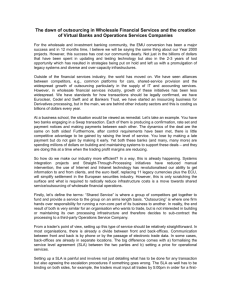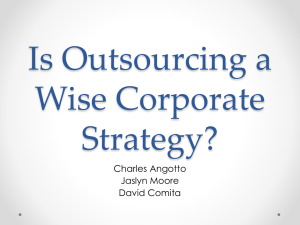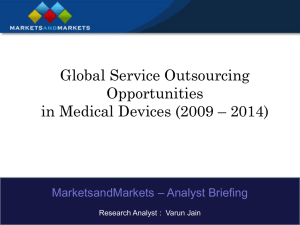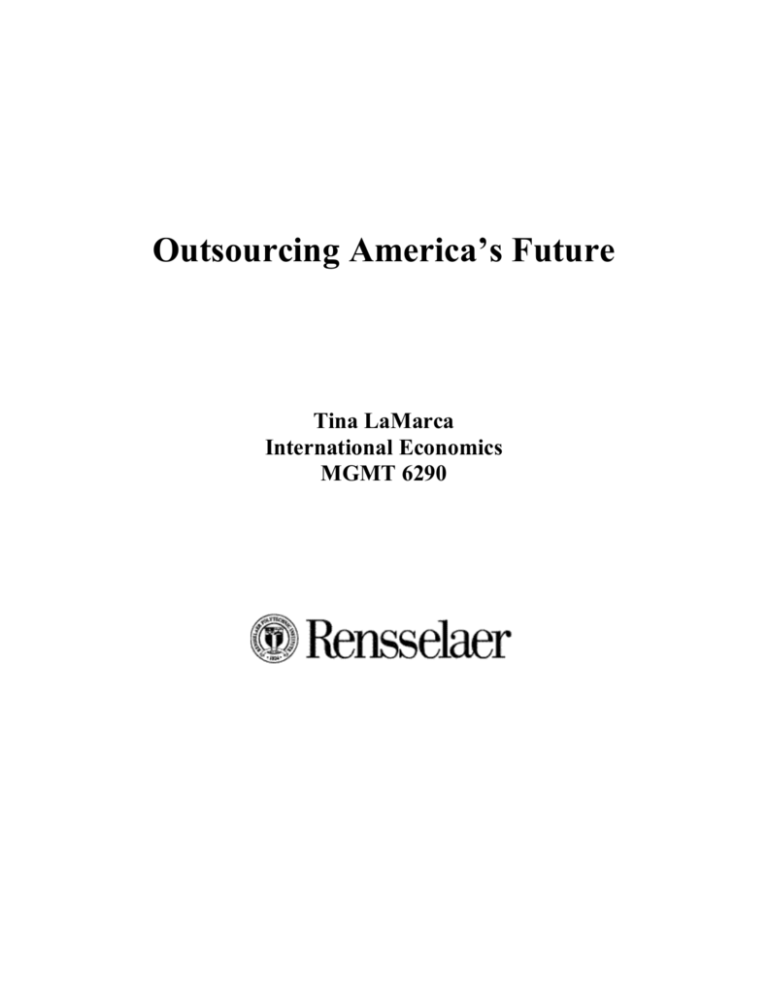
Outsourcing America’s Future
Tina LaMarca
International Economics
MGMT 6290
Thesis Statement
Outsourcing is an economic disadvantage that puts the long-term competitiveness of the
U.S. economy at risk.
Abstract
Offshore outsourcing is an increasingly popular phenomenon that can be viewed as
another form of international free trade. The concept of outsourcing stems from the idea
of comparative advantage which suggests that individuals, firms and nations are better at
producing certain goods and services and thus must concentrate on producing those over
others. This form of trade allows countries to specialize in producing narrower ranges of
goods, thus giving them greater efficiencies of large-scale production. While we can
prove that outsourcing has had a positive affect on short term economic growth, the long
term effects are yet unknown and may prove destructive. By outsourcing jobs of highly
skilled workers, knowledge is unavoidably transferred to developing economies. This
spillover creates clusters of growth that have the capability of competing with U.S.
corporations in future years. This paper will focus on the consequences outsourcing
imposes on business costs, returns to scale, American education, and business
knowledge. Will U.S. corporations really save money in the long run by transferring
work overseas?
1
Introduction
Outsourcing has provided organic growth to United States corporations and has enabled
them to reduce costs and compete more effectively in global markets. While this
proliferation of outsourcing has been beneficial to short term growth, it may also be
dissolving the competitive advantage that the country has enjoyed in the past century.
Through changing the historical model of economies of scale, the intangible
consequences and hidden costs of outsourcing will weigh heavily on the U.S. economy in
future years. The competitive advantage of high technology is at risk, and the spillover
will enable developing countries to compete directly with the United States.
Many economists view outsourcing as simply a new form of international free trade.
More commodities are tradable than were tradable in the past, which can be viewed as
either a good or bad thing. The general assumption of the American public is that jobs,
money, skills, and experience are being exported to foreign countries, and the people in
these foreign countries are making financial, socio-economic and development progress
while the U.S. economy is stagnated.
Consumers are accustomed to the fact that
manufactured goods are produced abroad and imported to the U.S., however now
consumers must accept the fact that services are also being produced overseas. It appears
that more and more U.S. companies are experimenting with outsourcing and offshoring
their labor and services with the impression that they are lowering their operating costs.
This experimentation has transformed the U.S. into a service oriented country with a
trade deficit that continues to grow resulting in more jobs being lost instead of being
created. The morale of U.S. workers has been destroyed and a sense of fear has been
2
injected into many Americans, including our highly skilled professionals. Although
unrealistic at this point in time, many believe the increase usage of outsourcing can
contribute to the U.S. becoming a third world country. Are we jeopardizing our position
in the world as a lead economic power?
The most notable outsourced divisions within a company have been customer
support/call centers, accounting, human resources and manufacturing. In today’s society
there has been a greater threat imposed on the American technology industry, such as
information technology and engineers. In addition, other highly skilled workers in R&D,
pharmaceutical, and financial positions have been impacted as well. Our highly skilled
workers are losing their jobs to companies overseas because of the lower labor costs
incurred. As can be expected, most American workers are not too keen on the idea of
outsourcing. For example, a software engineer at Microsoft is probably not likely to
jump up and down at the thought of losing his job to a worker in India, who is willing to
do the job for less than half the pay. By 2015, it is predicted that as many as 3.3 million
white-collar jobs and $136 billion in wages will leave the U.S. 1 In addition to employee
dissatisfaction, several other risks occur as a result of outsourcing that effect the overall
economy.
Why Outsource?
Outsourcing often refers to the delegation of non-core operations or jobs from internal
production to an external entity specializing in the management of that operation. The
decision to outsource is often made in the interest of lowering firm costs, redirecting or
1
McCarthy, John P. Forrester Research. 2002.
3
conserving energy directed at the competencies of a particular business, or to make more
efficient use of worldwide labor, capital, technology and resources. Though often used
interchangeably, outsourcing differs from offshoring in that outsourcing is relative to the
restructuring of the firm while offshoring is relative to the nation. Fundamentally,
outsourcing is a term relative to the organization of labor within and between societies. 2
Offshoring, also known as international outsourcing, can occur when a segment of a
nationally located production process gets moved offshore - perhaps still under the
control of a national firm, or sold off to a different firm operating overseas. These
concepts have become a popular trend among many U.S. companies and at times raise
controversial debates.
The single most important tactical reason for outsourcing is to reduce or control operating
costs and increase profits. Access to an outside provider’s lower cost structure is one of
the most compelling short-term benefits of outsourcing. Developing nations offer the
talents of a college-educated workforce at a fraction of U.S. salaries. Partnering with an
organization with world-class capabilities can offer access to new technology, tools and
techniques that the organization may not currently possess; more structured
methodologies, procedures and documentation, and a competitive advantage through
expanded skills. Competing corporations are outsourcing operations offshore to have the
cost advantages over the market and to free up management resources.
Although
outsourcing has achieved cost savings and has been used to enter key foreign markets,
these benefits may not outweigh the long-term impacts on U.S. industries and the
economy.
2
Wikipedia. <http://en.wikipedia.org/wiki/Outsourcing>.
4
Economies of Scale
When countries trade with each other one of their main goals is to achieve economies of
scale in production. Instead of the U.S. trying to produce everything domestically they
may decide to specialize in producing only certain types of goods or services at a larger
scale with the intent to lower costs. The U.S. will export those goods which formulate a
comparative advantage and import (outsource) those goods with lower labor costs. The
basic formula associated with economies of scale is:
AC = F/Q + c
Where AC is the average cost per unit produced, F is fixed costs, Q is the number of units
produced, and c is the marginal cost per unit. The fixed costs represent the overhead that
is independent of production, usually including rent, utilities, some personnel, etc. The
marginal cost, c, accounts for all costs accrued during the manufacture of a single unit,
usually including raw material, labor, etc. Labor may account for a significant portion of
the marginal costs, and as such, companies seek to reduce this expenditure. By moving
operations overseas, the firm may be able to employ cheaper labor and reduce marginal
costs per unit produced. Property, infrastructure, and even taxes may cost less overseas
and provide incentive for outsourcing operations.
We can easily account for these
tangible cost savings by using the economies of scale equation. It is more difficult to
account for the intangible effects as the equation does not take into account the hidden
costs associated with outsourcing.
5
The fixed costs associated with outsourcing likely account for the network necessary to
transfer product and knowledge between the outsourced locations and outsourcing firm.
These costs are likely very tangible and can be balanced using the economies of scale
equation. It is more difficult to account for the costs associated with the destruction of
competitive advantage, the skills of the American workforce and the intangible effects on
the economy.
Outsourcing our Knowledge
The United States tends to have a comparative advantage in industries with highly skilled
labor and capital requirements. These highly skilled workers possess a strong knowledge
base which contributes to the U.S. having a leading edge in the economy. Several
corporations have taken advantage of lowering their costs by outsourcing these jobs to
suppliers overseas, enabling them to concentrate solely on their core competencies. This
shuffling may appear to reduce costs and improve efficiency, but it also distributes
knowledge and facilitates international spillovers.
The economies that receive the
spillover benefit from the influx of knowledge and are able to use it to advance their own
economy. “If you rely too much on people in other companies and countries…you are
outsourcing your brains where you are making all the innovation.”3 As a result, the
competitiveness of the U.S. technology industry is placed at risk as the competitive
advantage associated with this work has been lost from U.S. control. Further, the U.S. is
forced to compete directly with developing countries in an area that was previously
monopolized.
Kallender, Paul. “Gates Warns Against Reliance on Outsourcing.” InfoWorld. 29 July 2005.
<http://www.infoworld.com/article/05/06/29/HNgateswarnsoutsourcing_1.html>.
3
6
Aerospace manufacturers, such as Boeing, have followed this model by reducing their
costs through outsourcing subassemblies (such as engines and structures).4
Their
attention is then directed to core competencies of design, assembling and marketing
aircraft. While this structure has reduced Boeing’s operating costs, it has created the new
problem of knowledge management as concerns have arisen about whether or not
technological expertise will be lost. “In the aerospace business, that means the partners
in other countries now building the components may one day be building the whole jet
themselves, thanks to the technology, training and contracts Boeing has provided.”5 To
combat this inevitability, the supply chain must now manage the knowledge that is
exported to suppliers. While Boeing actively mitigates for this spillover, it is impossible
to expect that all intellectual property associated with their work is protected.
Skills associated with aerospace construction, such as High Precision Machining, have
been developed in areas where the work is produced. These skills may be regarded as
intangible by the outsourcer, but they provide an area of expertise that a developing
country can leverage to create new products domestically. These new products may not
immediately compete with corporations such as Boeing, but they likely will in the long
term. As such, the competitive advantage associated with outsourced products is put in
jeopardy and the knowledge once controlled by domestic production is lost.
This
Jorge, Niosi & Majlinda, Zhequ. “Aerospace Clusters: Local or Global Knowledge Spillovers?” March
2005. <http://www.findarticles.com>.
5
Virgin, Bill. “Global Economy Complicates Outsourcing.” Seattlepi.com. 24 January 2006.
<http://www.seattlepi.nwsource.com/business>.
4
7
phenomenon is a direct consequence of outsourcing and could be eliminated through
industrial clustering, as seen in Silicon Valley.
Many economists would argue that companies could benefit more if they formed
industrial clusters, similar to computer chip manufacturers in Silicon Valley. Clusters are
groups of inter-related industries that drive wealth creation in a region, primarily through
exports of goods and services. As a result of these clusters, external economies of scale
occur within the industry which increases efficiency. Forming these clusters would
eliminate knowledge spillovers in foreign countries, which would allow the U.S. to
maintain their competitive advantage in the global economy. If a company chooses to
outsource they are risking the chance of compromising company practices due to
transferring this knowledge. “Each time we transfer knowledge bases overseas, whether
it be manufacturing or technology or research, that is a service that will obviously be
performed by a competing economy. And it is work that will not be done by the U.S.
economy and our workers. The result is – it could grow to an increasingly larger share of
the trade-deficit problem -- the result is further pressure on the U.S. economy.”6
Highly
skilled jobs should remain in the United States to avoid costs associated with the loss of
technological expertise.
To eliminate the urge to outsource highly skilled jobs overseas, companies can
incorporate labor market pools. According to Krugman, when external economies of
scale exist within an industry they can create a pooled market of workers with highly
Fleischer, Jeff. “Exporting America: An Interview with Lou Dobbs.” MotherJones. 7 February 2005.
<http://www.motherjones.com/news/qa/2005/02/lou_dobbs.html>.
6
8
specialized skills. This market is advantageous for the industry and the workers because
it maintains a constant supply of knowledgeable workers and lowers the risk of
unemployment within that region.7
This pool enables companies to leverage their
expertise and resources and omit the possibility of international spillovers. By being in
close proximity with each other, these companies can easily trade knowledge and new
ideas amongst themselves, thus increasing productivity. Although a foreign country may
be able to produce goods more cheaply (as seen below), these U.S. clusters maintain a
competitive advantage within the economy through inter-industry trade.
Localized
knowledge spillovers are cheaper because they eliminate transportation costs and result in
increasing returns to scale within the industry.
Cost
D
Industry
Cluster
Outsource
Output
Krugman, Paul R. & Obstfeld, Maurice. “International Economics Theory & Policy (7th Edition).”
(p.137). Pearson-Addison Wesley.
7
9
In addition to international knowledge spillovers, another long-term affect that poses a
threat to the American economy is the lack of local talent available to utilize. The
outsourcing trend has affected college enrollment because of the uncertainty that now
exists with outsourcing skilled jobs.
Disrupting Education in America
The fear of outsourcing is striking a chord with America’s future employees. Recently,
the education system has seen shifts in college enrollment, as college students have begun
to shun high-tech fields like computer science and even engineering. With the lack of
stability in these fields students are concerned that their jobs could eventually be
outsourced internationally and are therefore deciding to focus on their business skills.
The war for talent is at its fiercest in high-tech industries which poses a threat to the
future of the American technology industry and the overall economy.
American
companies may be forced to consider outsourcing not only to save costs, but due to lack
of local talent. Studies have shown that the proportion of incoming undergraduates
planning to major in computer science is now 70% below its peak in the early 1980s. 8
Companies are continuing to ship IT operations to developing countries such as India and
China, capitalizing on high-grade workers with local knowledge. These other countries
are investing heavily in education and training in order to attract and retain the best talent
and to help maintain a competitive edge in the economy. “Every year India produces
around 2.5 million university graduates, including 400,000 engineers and 200,000 IT
professionals. It is estimated that India has 28% of the world’s IT offshore talent. The
8
“The Battle for Brainpower.” The Economist. 07 October 2006
10
cost of an Indian graduate is roughly 12% of that of an American one.”9 These are just a
few of the advantages that India brings to the market, which is why the outsourcing boom
continues to grow. Why are students going to major in these fields with the assumption
that their jobs could be sent overseas to save a buck?
The figure below shows the software and computer services sector, where many young
college graduates found employment over the last decade. This sector is particularly
relevant to the offshoring debate and its net job losses were particularly steep in the last
recession. Even today, employment remains well beneath its pre-recession peak, even as
software investment has fully recovered.10
Source: Bureau of Economic Analysis and Bureau of Labor Statistics11
“The Battle for Brainpower.” The Economist. 07 October 2006
Bivens, Josh L. “EPI Issue Guide: Offshoring.” Economic Policy Institute. 31 May 2006.
<http://www.epi.org/content.cfm/issueguide_offshoring_faq>.
11
Bureau of Economic Analysis and Bureau of Labor Statistics. <http://www.bea.gov>.
9
10
11
Outsourcing appears to work contrary to the claim that free trade will create better jobs in
the U.S. These better jobs, which are usually high-tech, white collar jobs, are now being
transferred to foreign countries which limit opportunities for highly educated Americans.
The U.S focuses so much attention on higher education yet people cannot put their skills
or talent to use if their job is outsourced. “When manufacturing jobs started moving
overseas in larger numbers, American workers were told by free trade ideologues not to
worry, that the U.S. comparative advantage was in services—especially high-tech and
other knowledge-based industries. Displaced workers were told to simply acquire better
skills and more education in order to succeed in the changing American economy. Many
workers did, but now they find that knowledge and talent can’t compete against the chase
for higher profits and cheaper labor in the new global marketplace.”12 If Americans
decide not to invest in their education, companies will mitigate their chances of
sustaining a strong knowledge-base within the U.S. and induce the risk of international
spillovers.
The Escalating Trade Deficit
The increasing trade deficit has a long-term effect on the economic growth of the U.S. It
somewhat reflects on the relative strength of America’s economy and shows that we
continue to consume more than we produce. The U.S. cannot close its trade deficit if its
economy continues to be moved offshore. Outsourcing may have a minimal affect on the
trade deficit, however it still contributes to the U.S. exporting fewer goods and services.
When jobs are outsourced, the result is the destruction of an American job. Goods and
Fleischer, Jeff. “Exporting America: An Interview with Lou Dobbs.” MotherJones. 7 February 2005.
<http://www.motherjones.com/news/qa/2005/02/lou_dobbs.html>.
12
12
services produced in the U.S. (exports) are now being outsourced overseas and imported
back to the U.S., thus increasing the trade deficit. The figure below depicts the annual
trade deficit that started to compile in the early 1980s.
Outsourcing reduces the
purchasing power of workers and reduces their presence in the consumer market. When
unemployment occurs as a result of outsourcing, these consumers do little to help
stimulate the economy. Keeping jobs in the U.S. may minimally impact the deficit, but it
can help contribute to strengthening the overall economy.
1800
1600
1400
1200
1000
800
600
400
200
0
Represents trade deficit
Imports
04
20
02
20
00
20
92
19
88
19
84
19
80
19
76
19
72
19
68
19
64
Exports
19
19
60
$ Billions
Exports and Imports
Year
Source: St. Louis Federal Reserve Bank, FREDII 13
13
Economic Research Federal Reserve Bank of St. Louis. <http://www.research.stlouisfed.org/fred2>.
13
Conclusion
Outsourcing has transformed the ways in which nations interact. Corporations have
fragmented their operations internationally in order to concentrate exclusively on their
core competencies. Short-term benefits, such as cost savings were identified, however
several intangible consequences and hidden costs were overlooked that will have an
effect on the U.S. economy in the subsequent years ahead. There is still a lot we do not
know about outsourcing, largely because the available data does not provide information
needed to fully understand its magnitude, the reasons behind it, and the actual effects it
has on the economy. However, there is still substantial information that can be examined
to analyze the long-term consequences that will alter our economic status. The sudden
increase in outsourcing highly skilled professional jobs may be suspending our position
in the world as a lead economic power. Companies must realize that their strategic
advantages will thrive based on maximizing their knowledge-base, which is achieved
through employing highly educated U.S. workers.
14
References
1. McCarthy, John P. Forrester Research. 2002.
2. Wikipedia. <http://en.wikipedia.org/wiki/Outsourcing>.
3. Kallender, Paul. “Gates Warns Against Reliance on Outsourcing.” InfoWorld. 29 July
2005.
<http://www.infoworld.com/article/05/06/29/HNgateswarnsoutsourcing_1.html>.
4. Jorge, Niosi & Majlinda, Zhequ. “Aerospace Clusters: Local or Global Knowledge
Spillovers?” March 2005. <http://www.findarticles.com>.
5. Virgin, Bill. “Global Economy Complicates Outsourcing.” Seattlepi.com. 24 January
2006. <http://www.seattlepi.nwsource.com/business>.
6. Bureau of Economic Analysis and Bureau of Labor Statistics. <http://www.bea.gov>.
7. Fleischer, Jeff. “Exporting America: An Interview with Lou Dobbs.” MotherJones.
7 February 2005. <http://www.motherjones.com/news/qa/2005/02/lou_dobbs.html>.
8. Economic Research Federal Reserve Bank of St. Louis.
<http://www.research.stlouisfed.org/fred2>.
9. Krugman, Paul R. & Obstfeld, Maurice. “International Economics Theory & Policy
(7th Edition).” (p. 137). Pearson Addison Wesley.
10. “The Battle for Brainpower.” The Economist. 07 October 2006.
11. Bivens, Josh L. “EPI Issue Guide: Offshoring.” Economic Policy Institute. 31 May
2006. <http://www.epi.org/content.cfm/issueguide_offshoring_faq>.
15



